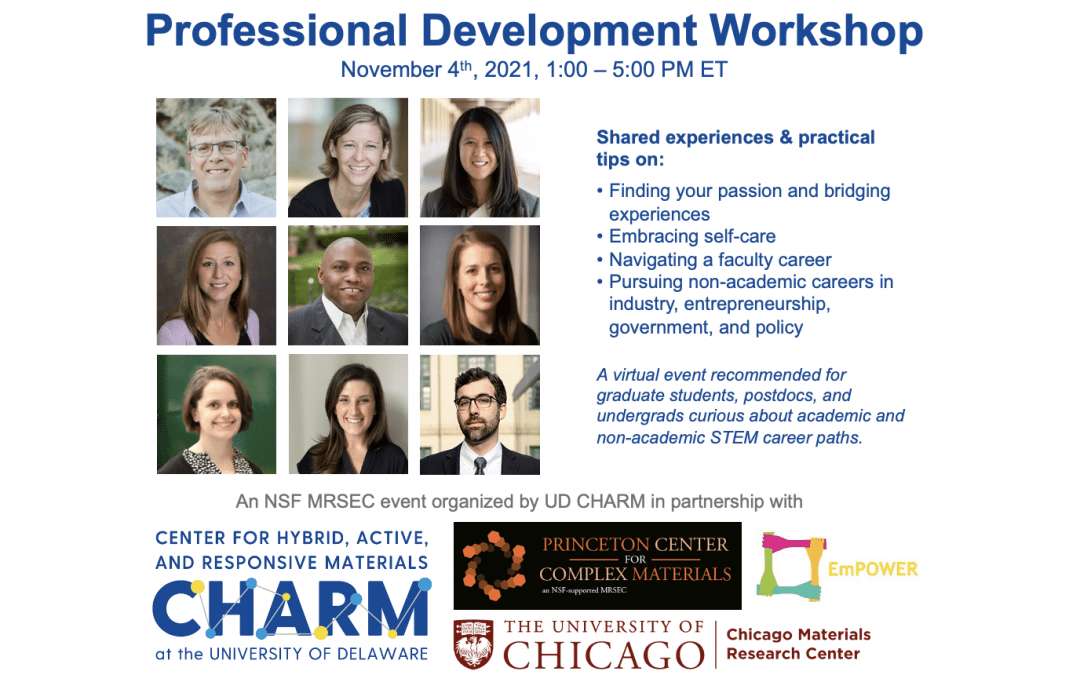Virtual Professional Development Workshop
November 4th, 2021 from 1:00 PM – 5:00 PM Eastern Time
Registration is required. A shareable flyer is available here.
The Materials Research Science and Engineering Centers (MRSECs) of the University of Delaware, Princeton University, and the University of Chicago present a 1/2-day virtual professional development workshop. This series of presentations and discussions is designed for undergraduates, graduate students, and postdoctoral researchers looking for more clarity on academic and non-academic career paths. Our speakers span materials science, chemistry, chemical engineering, and biomedical engineering disciplines across multiple sectors and this event aims to be accessible to any STEM student or early-career researcher. Attendees are encouraged to be active participants—there will be several opportunities to ask our speakers questions for a more personalized experience.
Agenda
Keynotes facilitated by Vinson Liao (EmPOWER member and UD Chemical Engineering graduate student in the Vlachos Research Group)
Keynote 1 (1:00 – 1:45 PM ET):
Speaking Different Languages: Nurturing the Conversation Between Industry and Academia
Prof. Timothy Long, Arizona State University, Director of the Biodesign Institute
Prof. Long received his Ph.D. in Chemistry from Virginia Tech under the direction of Prof. James McGrath, and he subsequently joined both Eastman Kodak and Eastman Chemical companies for eight years upon graduation. He joined the faculty in the Department of Chemistry at Virginia Tech, where he also served as the Director of the Macromolecules Innovation Institute until 2019. In 2020, Prof. Long accepted an interdisciplinary faculty position across the School of Molecular Sciences (SMS) and the School for Engineering Matter, Transport, and Energy (SEMTE) at Arizona State University (ASU) where he launched and currently leads the Biodesign Center for Sustainable Macromolecular Materials and Manufacturing (SM3). In addition to over 400 peer-reviewed publications, his research awards include the 2022 Paul J. Flory Award, 2020 Virginia Outstanding Faculty Award, 2015 Virginia Scientist of the Year, 2010 Virginia Tech Alumni Research Award, ACS PMSE Collaborative Research Award, PSTC Carl Dahlquist Award, 2019 ACS Rubber Division Thermoplastic Elastomer Award, and the ACS POLY Mark Scholar Award. He has served as the Chair of the ACS Division of Polymer Chemistry, Chair of the Gordon Research Conference in Polymers, 2012 Chair of the IUPAC World Polymer Congress, and he currently serves as the Past-President of the Adhesion Society. He is a member of advisory boards for leading journals, and he was appointed as Editor-in-Chief of Wiley Polymer International. Prof. Long’s most recent research efforts address the need for tailored advanced macromolecules for advanced manufacturing (3D printing), including vat photopolymerization, direct ink write, binder jetting, powder bed fusion, and melt extrusion. His interdisciplinary research establishes fundamental polymer structure-property-processing relationships with a lens of sustainability.
Keynote 2 (1:45 – 2:30 PM ET):
Self-Care is Not the Enemy of Performance
Prof. Jen Heemstra, Emory University, Department of Chemistry
Prof. Heemstra received her B.S. in Chemistry from the University of California, Irvine, in 2000. At Irvine, she performed undergraduate research with Prof. James Nowick investigating the folding of synthetic beta-sheet mimics, which instilled in her a love of supramolecular chemistry. She then moved to the University of Illinois, Urbana-Champaign, where she completed her Ph.D. with Prof. Jeffrey Moore in 2005 studying the reactivity of pyridine-functionalized phenylene ethynylene cavitands. After a brief stint in industry as a medicinal chemist, she moved to Harvard University to pursue postdoctoral research with Prof. David Liu exploring mechanisms for templated nucleic acid synthesis. In 2010, Prof. Heemstra began her independent career in the Department of Chemistry at the University of Utah and was promoted to Associate Professor with tenure in 2016. In 2017, Prof. Heemstra and her research group moved to the Department of Chemistry at Emory University. Research in the Heemstra lab is focused on harnessing the molecular recognition and self-assembly properties of nucleic acids for applications in biosensing and bioimaging. Outside of work, she enjoys spending time with her husband and two sons, as well as rock climbing, cycling, and running.
**Short break**
Panels facilitated by Brian Paul and Robert O’Dea (EmPOWER members, UD Chemical Engineering PhD Candidates in the Wagner and Epps Research Groups)
Panel 1 (2:45 – 3:45 PM ET): Experiences and tips for those on academic paths
- Lessons learned on the job circuit – from building your team to negotiation (Prof. Thomas O’Connor, Assistant Professor, Materials Sci. & Eng., Carnegie Mellon University)
- What it means to launch a new lab from scratch (Prof. Danielle Mai, Assistant Professor, Chemical Eng., Stanford University)
- Things I wish I knew before becoming faculty — navigating research, teaching, and service (Prof. Allie Obermeyer, Assistant Professor, Chemical Eng., Columbia University)
Panel 2 (3:45 – 4:45 PM ET): Insights and inspiration for non-academic careers
- Pursuing a career in industry project management (Dr. Jeannie Epps, Director of Applied Technology & Evaluation, Terumo Medical Corporation)
- Taking the leap with a lab to market experience (Dr. Julius Korley, Director of Entrepreneurship & Strategic Partnerships, College of Engineering, University of Delaware)
- Pursuing a career as a government scientist (Dr. Liz Kelley, Instrument Scientist, NIST)
- Using an advanced STEM degree for advocacy and policy (Dr. Lizzie Hunsaker, Energy & Environment Legislative Fellow, Office of U.S. Senator Chris Coons)
This NSF MRSEC collaborative event is organized by the Center for Hybrid, Active, and Responsive Materials (CHARM) in partnership with the Princeton Center for Complex Materials (PCCM) and the Chicago Materials Research Center (Chicago MRSEC). Session facilitation is provided by CBE EmPOWER, a graduate student-led organization in the University of Delaware’s Department of Chemical & Biomolecular Engineering that provides fellow students with a network and tools to support mental health and well-being.

